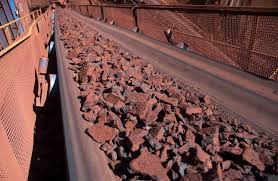China streamlined its inspection rules for
iron ore imports amid increasing debate about whether the $43
billion trade between the two nations will be caught up in their
escalating spat.
While the Global Times — a tabloid run by the flagship
newspaper of the Communist Party — said the simplification of
rules is aimed at facilitating trade, the publication noted it
comes at a “delicate” time in the relationship between Australia
and China after the former called for an investigation into the
origins of the coronavirus pandemic.
From next month, China’s customs administration will
examine iron ore imports when requested by the trader or
importer, a move away from the current system that sees all
cargoes inspected. Traders and analysts in Asia said the move
had been in the works for a while and is likely to have
negligible impact on the iron ore market.
Commodities have emerged as a flash point in the
deteriorating relationship, with Beijing this month imposing
anti-dumping duties on Australian barley, suspending meat
imports from four facilities and considering targeting more
products. While that sparked speculation iron ore — Australia’s
most-valuable export — could be in the firing line, any curbs
on shipments risk hurting China’s massive steel industry.
“On first look, it is a streamlining of existing processes.
Although the timing for the announcement comes at a sensitive
time,” said Marex Spectron Group analyst Hui Heng Tan. “However,
with thin mill margins, low iron ore inventory at ports and
mills, high dependency on imports, and potential supply issues
at Brazil, I seriously do not think this would curb Australia
imports because it would come at their own expense.”
China imports more than 60% of its iron ore from Australia,
and would struggle to make up volumes from other sources.
Brazilian shipments have been constrained by bad weather and its
emergence as a coronavirus hotspot has boosted concerns that
operations may be curtailed.
At the same time, China is churning out vast amounts of
steel and market expectations are that infrastructure stimulus
will feature in the country’s plans to boost economic growth
this year.
Miners
Rio Tinto Group didn’t immediately respond to a request for
comment. BHP Group said it’s supportive of the changes, which
will create a more efficient supply chain and have the potential
to speed up the process for all parties. Fortescue Metals Group
Ltd. Chief Executive Officer Elizabeth Gaines said the company
welcomes the change, which is part of a wider set of efficiency
reforms China’s government has developed since 2015.
Miners’ shares declined, with Fortescue dropping 2.5%, Rio
falling 0.7% and BHP retreating 0.3%. Iron ore futures in
Singapore rose 0.2%, while prices in China gained 0.8%.
“If these are commitments to streamline the processing of
iron ore shipments that are arriving at ports in China, then on
the whole that’s a reform to be welcomed,” Australia’s Trade
Minister Simon Birmingham said Thursday. “Early indication in
talking with industry are that this could provide an opportunity
for benefits both to China and to Australia in reducing
administration costs of shipments.”
Birmingham also said his request to talk with his Chinese
counterpart to try to resolve recent trade disputes still hasn’t
been answered.
The latest change to iron ore imports is focused on
optimizing procedures and would benefit Chinese importers,
according to a report by Shanghai Metals Market. China has
previously made changes to inspection procedures, including
allowing products to be released before being examined, it said.
(Bloomberg)
